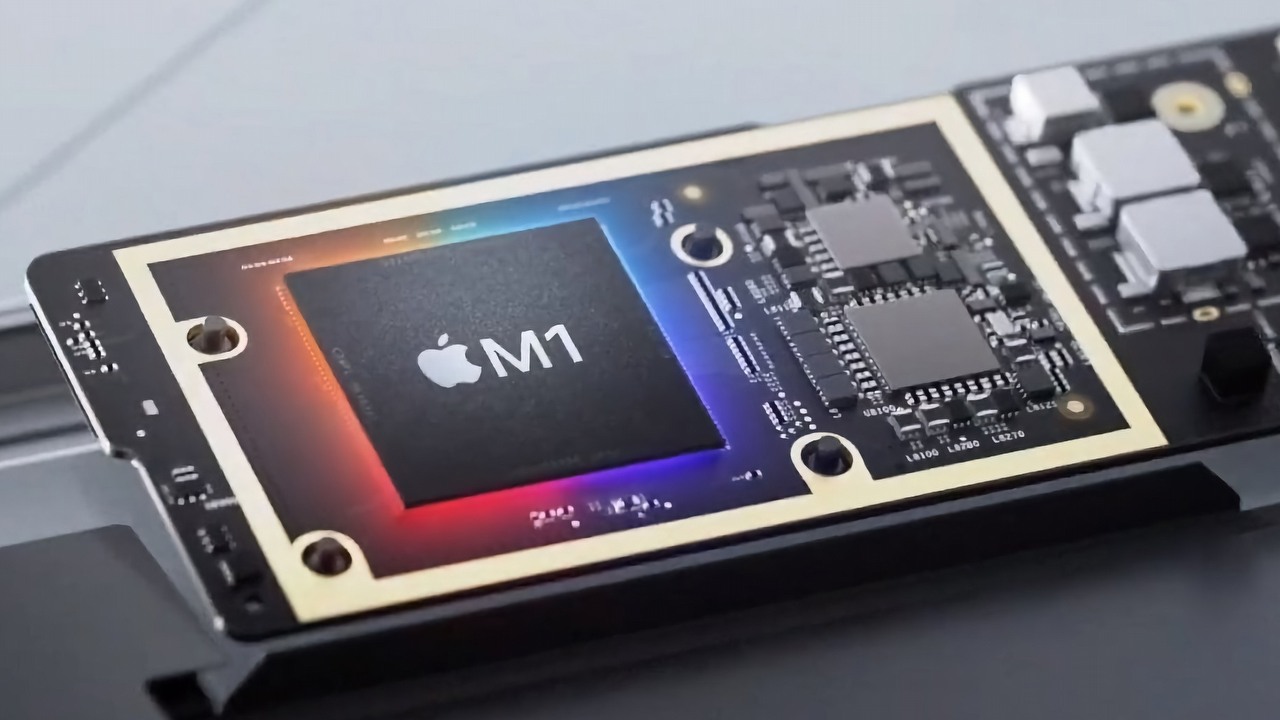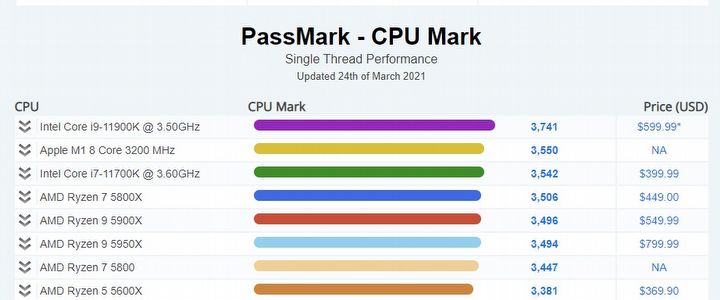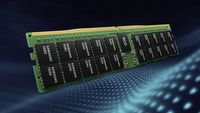Apple's M1 CPU Bested Intel Core i7-11700K in Benchmark
Some interesting CPU test results have appeared on Passmark's website. The Apple M1, known mostly from Mac laptops, won against the i7-11700K in single-core performance.

For many years, Apple used Intel processors in its computers. However, this changed in the second half of 2020, and the result was the release of Mac Mini computers with the Apple M1 processor. The device - to the amusement of internet users - turned out to run Windows 10 better than Microsoft's own device. Now Apple's solution has embarrassed (as some want) its recent partner. Apple M1 processor's results achieved in PassMark benchmark for single core were published on the web. The CPU achieved second place and overtook not only Ryzen on Zen 3 architecture, but also Intel Core i7-11700K.
As we can see, the difference is so insignificant (0.2%) that it is within the margin of error. It's also safe to assume that Apple's chip doesn't stand much of a chance against Intel's solutions in multi-threaded tests, thanks to the lack of Hyper-Threading, among other things. Moreover, new microcode updates for Intel's 400 and 500 series motherboards may wipe out Apple M1's already modest advantage. We are also still waiting for Intel processors from the much-delayed Alder Lake series and, last but not least, the release of the i7-11700K and the rest of the Rocket Lake-S line, and thus the results of independent tests, which will take place on March 30.
That said, there are several factors to consider. Apple M1 is a processor used primarily in MacBook laptops and miniPCs, the cheapest variant of which is priced at around $3.7k, while the i7-11700K alone costs more than half that amount (around $2k). What's more, according to pretty much confirmed leaks, a successor to the former chip is already in the making: the 12-core Apple M1X, which is supposed to be much more efficient than its predecessor, scoring almost twice as much in multi-threaded tests (single-core performance will remain unchanged; via NotebookCheck.net).
A less important, but rather ironic fact worth noting is the image issues. Recently, Intel launched a new marketing campaign featuring actor Justin Long. At the turn of the century he was known from Apple commercials and the slogan "Hello, I'm Mac". Now, however, he's referenced that in Intel ads as a newly converted PC user comparing the new platform to Mac. The campaign was received coldly, not least because Long cited arguments for buying a PC that had virtually nothing to do with Intel itself.
In this context, it may be considered funny that Intel's PC processor not only turned out to be slower in games than its predecessor, but also lost in a test (even if only in one) to a product intended for laptops, which is somehow disregarded in Intel's advertisements. It's also the first standalone CPU chip for Macs developed by Apple (the earlier T-series chips were a back-up for Intel processors). For some, this is reason enough to talk about Apple embarrassing Intel.
It should be mentioned that some time after the publication of the aforementioned commercials, Pat Gelsinger (Intel's CEO) expressed his desire to re-establish cooperation with Apple (see Yahoo!). A little earlier he also revealed a new initiative of the company, including... plans of manufacturing ARM chips used in Apple M1. For now, however, Mac fans can enjoy a small victory for their favorite company.
0

Author: Jacob Blazewicz
Graduated with a master's degree in Polish Studies from the University of Warsaw with a thesis dedicated to this very subject. Started his adventure with gamepressure.com in 2015, writing in the Newsroom and later also in the film and technology sections (also contributed to the Encyclopedia). Interested in video games (and not only video games) for years. He began with platform games and, to this day, remains a big fan of them (including Metroidvania). Also shows interest in card games (including paper), fighting games, soulslikes, and basically everything about games as such. Marvels at pixelated characters from games dating back to the time of the Game Boy (if not older).
Latest News
- Need help with “Italian New Year’s dish” in Cookie Jam? Here’s the answer you’re looking for
- Stuck on “A popular US veggie served on New Year’s” in Cookie Jam? Here’s the answer
- Meaningful decisions through limited choice. How the devs behind Tiny Bookshop were inspired to design their hit cozy game
- The hidden details behind V and David’s very different downfalls in Cyberpunk 2077 and Edgerunners
- „They're a bit outdated.” Baldur's Gate 3 director warns those who want to „prepare” for Divinity by playing older installments


